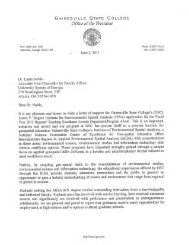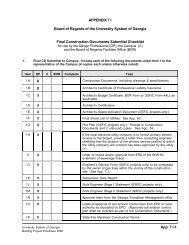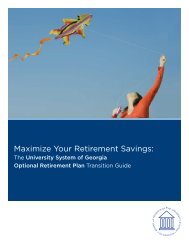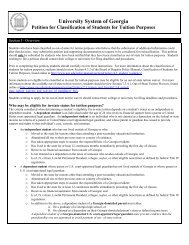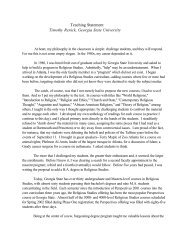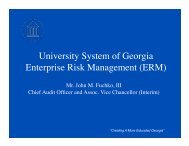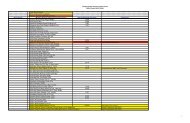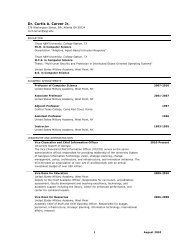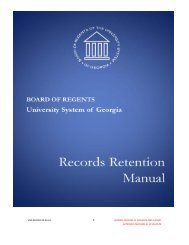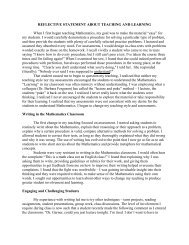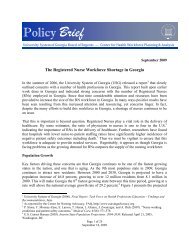WReier-Aviles on DSKGBLS3C1PROD with RULES266918 Federal Register / Vol. 75, No. 209 / Friday, October 29, 2010 / Rules and Regulationsinstitution to make a number <strong>of</strong>disclosures to students and to the extentthat any <strong>of</strong> these disclosures areinaccurate and constitute substantialmisrepresentation, they are actionable.The <strong>Department</strong> believes that thetotality <strong>of</strong> its regulations provides asufficient basis to protect against themaking <strong>of</strong> substantialmisrepresentations without creatinganother category <strong>of</strong> misrepresentationsthat are more logically covered withinthe context <strong>of</strong> disclosures.In addition, we disagree with thecommenter who argued that oralstatements should not be included inthe definition <strong>of</strong> the termmisrepresentation. We have seen andheard clear and unambiguous examples<strong>of</strong> oral statements that we view asmisrepresentations in the GAO’s video<strong>of</strong> its undercover testing.With respect to the commenters whoexpressed concern about how theseregulations may affect an institution’sability to use the Internet for marketingpurposes, we note that it should notmatter where a misrepresentation takesplace. What is important is to curb thepractice <strong>of</strong> misleading studentsregarding an eligible institution,including about the nature <strong>of</strong> itseducational program, its financialcharges, or the employability <strong>of</strong> itsgraduates. We strongly believe thatinstitutions should be able to find a wayto comply with these regulations whenusing the Internet for marketing.Finally, we understand the manycomplexities <strong>of</strong> domain nameownership, trademark infringement andthe like and will ensure that we aretargeting the correct entities in anyenforcement action we take under theseregulations.Changes: None.Comment: Several commentersobjected to including testimonials andendorsements in the definition <strong>of</strong>misrepresentation, because doing soholds institutions responsible forunsolicited testimonials orendorsements <strong>of</strong> any kind. Thecommenters noted that testimonials arewidely used as the most relevant form<strong>of</strong> marketing. One commenter suggestedthat we modify the regulations to referto testimonials that the institution‘‘requested’’ a student to make ‘‘as part<strong>of</strong> the student’s program’’ as opposed to‘‘required’’ the student to make ‘‘toparticipate in a program.’’ Anothercommenter believed we should expandthe definition <strong>of</strong> the termmisrepresentation to includeendorsements or testimonials for whichstudents are given incentives orrewards.Discussion: The <strong>Department</strong> disagreesthat changes to the definition <strong>of</strong>misrepresentation are needed. First,with respect to the commenters whostated that the definition is too broad,we note that the thrust <strong>of</strong> the definitionis that the statement must be false,erroneous, or misleading. The inclusionwithin the definition <strong>of</strong> certain studentendorsements or testimonials (i.e., thosethat are given under duress or arerequired for participation in a program)establishes the circumstances underwhich endorsements or testimonials arenecessarily considered to be false,erroneous, or misleading. We believethat including these types <strong>of</strong>endorsements and testimonials in thedefinition <strong>of</strong> misrepresentation isappropriate because endorsements ortestimonials provided under thesecircumstances are suspect, at best.Second, we do not believe it isnecessary to expand the definition <strong>of</strong>misrepresentation to includeendorsements or testimonials for whichstudents are given incentives orrewards. We do not believe that anendorsement or testimonial for which astudent was given a token reward suchas a mug or t-shirt should automaticallybe considered false, erroneous, ormisleading.Changes: None.Nature <strong>of</strong> <strong>Education</strong>al Program(§ 668.72)Comment: One commenter supportedthe proposed changes to § 668.72 statingthat the changes will reduce themotivation for institutions to useaggressive and misleading recruitmenttactics to increase enrollment. Thecommenter noted that the requirementsin this section align with theirassociation’s principles <strong>of</strong> good practiceunder which members represent andpromote their schools, institutions orservices by providing preciseinformation about their academic majorand degree programs.Discussion: The <strong>Department</strong>appreciates this support.Changes: None.Comment: One commenter stated that§ 668.72 was inherently unclear andasked for additional clarificationwithout providing any specifics.Discussion: The <strong>Department</strong> disagreeswith this commenter and believes thatthe language in this section is clear.Moreover, because only false, erroneous,or misleading statements that constitutesubstantial misrepresentations arepotentially actionable, institutions areon notice as to what they need to do toassure themselves <strong>of</strong> compliance.Changes: None.VerDate Mar2010 14:10 Oct 28, 2010 Jkt 223001 PO 00000 Frm 00088 Fmt 4701 Sfmt 4700 E:\FR\FM\29OCR2.SGM 29OCR2Comment: Some commentersrecommended that we add language tothis section to address specific concernsabout clinical experience. Onecommenter argued that institutionsshould be required to inform students <strong>of</strong>any clinical experience the studentneeds to obtain a required license orcertification, whether the institution orthe student secures the appropriateclinical placement, and how the clinicalexperience relates to the ability toobtain employment. The commenterargued that the failure to inform astudent <strong>of</strong> this information shouldconstitute misrepresentation.Discussion: We believe that thelanguage in § 668.72 sufficiently coversfalse, erroneous, or misleadingstatements made by institutionsconcerning their educational programs.We further note that information such asthat suggested by the commenter ismore appropriately addressed in thestudent consumer informationdisclosures contained in subpart D <strong>of</strong>part 668 and note that institutions arerequired to disclose information aboutthe academic program <strong>of</strong> the institution,which would include information aboutany required clinical experience.Changes: None.Comment: One commenter suggestedthat we add language to § 668.72 tospecifically address misrepresentationrelated to whether course credits earnedat the institution are transferable towarda substantially similar degree. Thiscommenter noted that, in some cases,courses may be accepted but not counttoward a degree at the new institution.Discussion: We believe that thelanguage in § 668.72(b)(1), whichprohibits false, erroneous, or misleadingstatements about whether a student maytransfer course credits earned at theinstitution to any other institution, issufficient and provides more protectionfor students than the commenter’ssuggestion to limit the coverage tostatements related to whether coursecredits are transferable toward asubstantially similar degree.Changes: None.Comment: A few commenterssuggested that we expand § 668.72(c)(2)to include ‘‘States in which the programis <strong>of</strong>fered’’ rather than merely ‘‘the Statein which the institution is located’’ sothat the requirement reaches studentswho are enrolled through distancelearning. One commenter noted thatinstitutions that <strong>of</strong>fer courses onlineshould have additional responsibilitiesto students who take these courses. Thecommenter also asserted that theseinstitutions should know andcommunicate to students what theState’s requirements are to be employed
Federal Register / Vol. 75, No. 209 / Friday, October 29, 2010 / Rules and Regulations66919WReier-Aviles on DSKGBLS3C1PROD with RULES2in that job and whether successfulcompletion <strong>of</strong> the program will qualifythem for such a job. Another commenterstated that an institution should knowState licensing requirements in all theStates in which it is providing theprogram and further opined that if theinstitution does not know therequirements, it could limit enrollmentto students residing in the States inwhich it does know.Discussion: The <strong>Department</strong> agreeswith the commenters who believeinstitutions should be responsible formaking statements that are not false,erroneous, or misleading in States inwhich the institution’s educationalprograms are <strong>of</strong>fered and not only in theState where the institution is located.Changes: We have revised § 668.72(c)to prohibit false, erroneous, ormisleading statements concerningwhether completion <strong>of</strong> an educationalprogram qualifies a student for licensureor employment in the States in whichthe educational program is <strong>of</strong>fered.Comment: One commenter suggestedthat we add ‘‘including the recognizedoccupations for which the programprepares students’’ at the end <strong>of</strong>§ 668.72(g) to address the proposedrequirements in § 668.6(b)(1) underwhich an institution must disclose onits Web site the occupations theprogram prepares students to enter andthat we add a new paragraph to addressmisrepresentation about the kinds <strong>of</strong>disclosures that will be required underproposed § 668.6.Discussion: We disagree with thecommenter’s suggestion to add languagein § 668.72 to address the proposedregulations in § 668.6. The language in§ 668.72(g) prohibits false, erroneous, ormisleading statements concerning theavailability, frequency, andappropriateness <strong>of</strong> its courses andprograms to the employment objectivesthat it states its programs are designedto meet. We believe that this languageis sufficient to guard againstmisrepresentation in the disclosuresrequired under § 668.6. For additionalinformation on those requirements,please see the section on GainfulEmployment (§ 668.6) earlier in thepreamble to these final regulations.Changes: None.Comment: Some commentersrecommended that we add language tothis section to address specific concernsabout accreditation. One commentersuggested that the regulations bemodified to require an institution toexplicitly disclose a lack <strong>of</strong> specializedprogram or institutional accreditation ifsuch accreditation is associated with theability to apply to take or to take, theexamination required for a local, State,or Federal license, or a nongovernmentalcertification generallyrequired as a precondition foremployment or to perform certainfunctions in the State in which theinstitution is located. Some commenterssuggested that misrepresentation relatedto requirements that are generallyneeded to be employed in the fields forwhich the training is provided beexpanded to include withheldinformation. The commenters cited thetestimony <strong>of</strong> Yasmine Issa who testifiedbefore the Senate Health, <strong>Education</strong>,Labor, and Pensions Committee on June24, 2010. Ms. Issa testified thatimportant information about the value<strong>of</strong> the educational credential she waspursuing and future employability waswithheld. In particular, the program inwhich she was enrolled lackedspecialized accreditation and, as aresult, she was unable to sit for alicensing exam. The commenters arguedthat omission <strong>of</strong> important informationshould constitute misrepresentation ifsuch omission is likely to lead someoneto make incorrect assumptions ashappened with Ms. Issa.Discussion: The <strong>Department</strong> agreeswith the commenters who requestedthat we expand these regulations toprohibit the withholding <strong>of</strong> informationrelated to requirements that aregenerally needed to be employed in thefields for which the training is provided.To address circumstances such as theones experienced by Ms. Issa, the<strong>Department</strong> has inserted the words ‘‘orrequires specialized accreditation’’ in§ 668.72(n). As amended, this provisionnow provides that misrepresentationconcerning the nature <strong>of</strong> an eligibleinstitution’s educational programincludes any failure by an eligibleinstitution to disclose the fact that adegree has not been authorized by theappropriate State educational agency orthat it requires specialized accreditationin any advertising or promotionalmaterials that reference such degree.Changes: We have revised § 668.72(n)to include a failure to disclose that thedegree requires specializedaccreditation as misrepresentation.Employability <strong>of</strong> Graduates (§ 668.74)Comment: Some commenters raisedconcerns about misrepresentationrelated to the institution’s knowledgeabout the current or likely futureemployment conditions, compensationor opportunities in the occupation forwhich students are being prepared.Commenters argued that predictionsabout future employment orcompensation should not be deemedmisrepresentations unless suchpredictions are based on statements <strong>of</strong>VerDate Mar2010 14:10 Oct 28, 2010 Jkt 223001 PO 00000 Frm 00089 Fmt 4701 Sfmt 4700 E:\FR\FM\29OCR2.SGM 29OCR2fact which at the time they were madeare objectively false or themselvesmisleading. The commenters requestedconfirmation that general statements <strong>of</strong>opinion about the benefits <strong>of</strong> enrollingin or completing a program would notbe treated as misrepresentation aboutthe future. Other commenters soughtclarification that any informationprovided by an institution that isdirectly attributable to a State or theFederal government or any direct link toa governmental Web site such as theO*NET Web site would not beconsidered misrepresentation if the dataand projections from the government oron the Web site are incorrect, confusing,or do not come true.Discussion: As noted elsewhere inthis preamble, the regulations in subpartF <strong>of</strong> part 668 only address false,erroneous, or misleading statements.Moreover, in enforcing this subpart, the<strong>Department</strong> intends to continue tocarefully evaluate all <strong>of</strong> the surroundingcircumstances before reaching anyconclusions regarding the occurrence <strong>of</strong>a violation and the appropriateresponse. Predictions that are not basedon false or misleading information,general statements and opinions, andinformation provided by State andFederal governments would not be thebasis for a misrepresentation claim.Changes: None.Ability To Benefit (§ 668.32(e) andSubpart J)Student Eligibility—General(§ 668.32(e))Comment: Most commenterssupported the <strong>Department</strong>’simplementation <strong>of</strong> section 484(d)(4) <strong>of</strong>the HEA, which was added in 2008.This statutory change provided that astudent shall be determined by aninstitution <strong>of</strong> higher education as havingthe ability to benefit from the educationor training <strong>of</strong>fered by the institution <strong>of</strong>higher education upon satisfactorycompletion <strong>of</strong> six credit hours, or theequivalent coursework that areapplicable toward a degree or certificate<strong>of</strong>fered by the institution. Severalcommenters expressed appreciation forthe implementation <strong>of</strong> this new option<strong>of</strong> establishing an ability to benefit.Several <strong>of</strong> the commenters supportedthe equivalency <strong>of</strong> the six credit hoursto six semester, six trimester, six quarterhours or 225 clock hours. Onecommenter expressly supported thecontinued individual institutionaldetermination to accept any <strong>of</strong> theability-to-benefit (ATB) optionsavailable in current § 668.32(e). Onecommenter recommended that the
- Page 1 and 2:
Friday,October 29, 2010Part IIDepar
- Page 3 and 4:
Federal Register / Vol. 75, No. 209
- Page 6 and 7:
66836 Federal Register / Vol. 75, N
- Page 8 and 9:
66838 Federal Register / Vol. 75, N
- Page 10 and 11:
WReier-Aviles on DSKGBLS3C1PROD wit
- Page 12 and 13:
66842 Federal Register / Vol. 75, N
- Page 14 and 15:
66844 Federal Register / Vol. 75, N
- Page 16 and 17:
WReier-Aviles on DSKGBLS3C1PROD wit
- Page 18 and 19:
66848 Federal Register / Vol. 75, N
- Page 20 and 21:
66850 Federal Register / Vol. 75, N
- Page 22 and 23:
WReier-Aviles on DSKGBLS3C1PROD wit
- Page 24 and 25:
66854 Federal Register / Vol. 75, N
- Page 26 and 27:
WReier-Aviles on DSKGBLS3C1PROD wit
- Page 28 and 29:
66858 Federal Register / Vol. 75, N
- Page 30 and 31:
66860 Federal Register / Vol. 75, N
- Page 32 and 33:
66862 Federal Register / Vol. 75, N
- Page 34 and 35:
66864 Federal Register / Vol. 75, N
- Page 36 and 37:
66866 Federal Register / Vol. 75, N
- Page 38 and 39: WReier-Aviles on DSKGBLS3C1PROD wit
- Page 40 and 41: WReier-Aviles on DSKGBLS3C1PROD wit
- Page 42 and 43: 66872 Federal Register / Vol. 75, N
- Page 44 and 45: WReier-Aviles on DSKGBLS3C1PROD wit
- Page 46 and 47: WReier-Aviles on DSKGBLS3C1PROD wit
- Page 48 and 49: WReier-Aviles on DSKGBLS3C1PROD wit
- Page 50 and 51: 66880 Federal Register / Vol. 75, N
- Page 52 and 53: WReier-Aviles on DSKGBLS3C1PROD wit
- Page 54 and 55: 66884 Federal Register / Vol. 75, N
- Page 56 and 57: 66886 Federal Register / Vol. 75, N
- Page 58 and 59: WReier-Aviles on DSKGBLS3C1PROD wit
- Page 60 and 61: WReier-Aviles on DSKGBLS3C1PROD wit
- Page 62 and 63: WReier-Aviles on DSKGBLS3C1PROD wit
- Page 64 and 65: WReier-Aviles on DSKGBLS3C1PROD wit
- Page 66 and 67: WReier-Aviles on DSKGBLS3C1PROD wit
- Page 68 and 69: WReier-Aviles on DSKGBLS3C1PROD wit
- Page 70 and 71: WReier-Aviles on DSKGBLS3C1PROD wit
- Page 72 and 73: 66902 Federal Register / Vol. 75, N
- Page 74 and 75: WReier-Aviles on DSKGBLS3C1PROD wit
- Page 76 and 77: WReier-Aviles on DSKGBLS3C1PROD wit
- Page 78 and 79: 66908 Federal Register / Vol. 75, N
- Page 80 and 81: WReier-Aviles on DSKGBLS3C1PROD wit
- Page 82 and 83: 66912 Federal Register / Vol. 75, N
- Page 84 and 85: WReier-Aviles on DSKGBLS3C1PROD wit
- Page 86 and 87: 66916 Federal Register / Vol. 75, N
- Page 90 and 91: WReier-Aviles on DSKGBLS3C1PROD wit
- Page 92 and 93: WReier-Aviles on DSKGBLS3C1PROD wit
- Page 94 and 95: 66924 Federal Register / Vol. 75, N
- Page 96 and 97: WReier-Aviles on DSKGBLS3C1PROD wit
- Page 98 and 99: 66928 Federal Register / Vol. 75, N
- Page 100 and 101: WReier-Aviles on DSKGBLS3C1PROD wit
- Page 102 and 103: 66932 Federal Register / Vol. 75, N
- Page 104 and 105: WReier-Aviles on DSKGBLS3C1PROD wit
- Page 106 and 107: 66936 Federal Register / Vol. 75, N
- Page 108 and 109: 66938 Federal Register / Vol. 75, N
- Page 110 and 111: 66940 Federal Register / Vol. 75, N
- Page 112 and 113: 66942 Federal Register / Vol. 75, N
- Page 114 and 115: 66944 Federal Register / Vol. 75, N
- Page 116 and 117: 66946 Federal Register / Vol. 75, N
- Page 118 and 119: WReier-Aviles on DSKGBLS3C1PROD wit
- Page 120 and 121: WReier-Aviles on DSKGBLS3C1PROD wit
- Page 122 and 123: WReier-Aviles on DSKGBLS3C1PROD wit
- Page 124 and 125: 66954 Federal Register / Vol. 75, N
- Page 126 and 127: WReier-Aviles on DSKGBLS3C1PROD wit
- Page 128 and 129: 66958 Federal Register / Vol. 75, N
- Page 130 and 131: 66960 Federal Register / Vol. 75, N
- Page 132 and 133: WReier-Aviles on DSKGBLS3C1PROD wit
- Page 134 and 135: WReier-Aviles on DSKGBLS3C1PROD wit
- Page 136 and 137: WReier-Aviles on DSKGBLS3C1PROD wit
- Page 138 and 139:
66968 Federal Register / Vol. 75, N
- Page 140 and 141:
66970 Federal Register / Vol. 75, N
- Page 142 and 143:
66972 Federal Register / Vol. 75, N
- Page 144 and 145:
66974 Federal Register / Vol. 75, N



